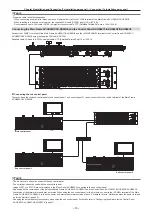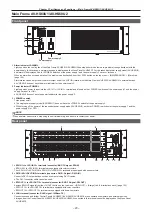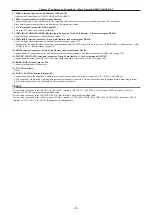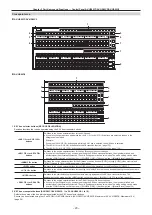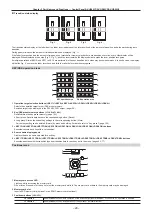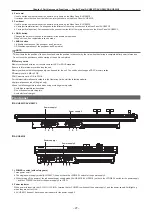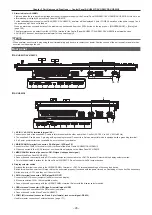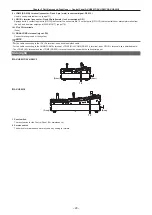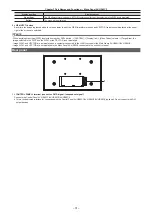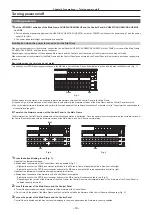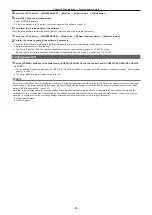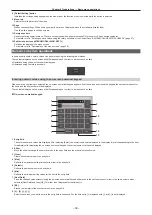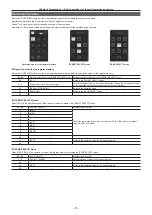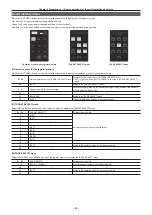
– 28 –
Chapter 3 Part Names and Functions — Control Panel AV‑HS60C1/AV‑HS60C2/AV‑HS60C4
3
Alarm indicator <ALARM>
Lights up when there is a problem (voltage decrease) in the power supply of the Control Panel AV-HS60C1/AV-HS60C2/AV-HS60C4. At this time, an
alarm message is displayed on the Menu Panel AV-HS60C3.
For the redundant power supply model (AV-HS60C2 /AV-HS60C4), an alarm will be displayed if both <POWER> switches of the power supply 1 and
the power supply 2 have not turned on.
When an alarm has occurred, details of the problem can be checked from the <SYS> button on the top menu
→
[MAINTENANCE]
→
[Alarm] tab.
(page 156)
The alarm status can be output from the <GPI I/O> terminal of the Control Panel AV-HS60C1/AV-HS60C2/AV-HS60C4 to external devices.
f
AV-HS60C1 does not have the alarm indicator for the power supply 2.
@
@
NOTE
t
When an alarm has occurred, stop using the unit immediately, and be sure to contact your dealer. Continuous use of the unit even after an alarm has
occurred could damage the unit.
Rear panel
r
AV‑HS60C1/AV‑HS60C2
MENU PANEL
MAIN FRAME
GPI I/O
COM1 (M)
COM2 (RS-232)
DVI-D
USB
2
3
5
4
6
7
8
9
1
10 11
r
AV‑HS60C4
MENU PANEL
MAIN FRAME
GPI I/O
COM1 (M)
COM2 (RS-232)
DVI-D
USB
2
3
5
4
6
7
8
9
1
10 11
1
<AC IN 1>/<AC IN 2> terminals (signal: AC)
Connects one end of the supplied AC cable to this terminal and the other end to the AC outlet. (AC 100 V to 240 V, 50 Hz/60 Hz)
f
The supplied AC cable has a 3-pin plug with a grounding terminal. Connect to a 3-pin power outlet which is equipped with a grounding terminal.
f
If a 3-point power outlet is not available, be sure to consult your dealer.
2
<MAIN FRAME> terminal (connector: RJ‑45/signal: 100Base‑TX)
Connects to the <PANEL> terminal or <LAN> terminal of the Main Frame AV-HS60U1/AV-HS60U2.
f
When connected to the <LAN> terminal, no video will be displayed on the Menu Panel AV-HS60C3.
3
<MENU PANEL> terminal (connector: DVI‑D/signal: independent signal)
Connects the Menu Panel AV-HS60C3.
f
Cannot be used concurrently with a DVI monitor (computer) connected to the <DVI-D> terminal. Select with the display selector switch.
f
This is the dedicated interface for the Menu Panel AV-HS60C3. Do not connect with DVI output devices.
4
Display selector switch
Switches the terminal to be used to the <MENU PANEL> terminal or <DVI-D> terminal depending on the connected device.
Switch this when the power is off. Output will not be performed properly if switched with the power turned on. Restarting of the unit will be necessary.
Set the power to <OFF>, and then set it back to <ON>.
5
<DVI‑D> terminal (connector: DVI‑D/signal:DVI OUT)
Connects the DVI monitor (computer) used for the menu display.
f
Monitor resolution: 1366
×
768 compatible monitor
f
Cannot be used concurrently with the <MENU PANEL> terminal. Select with the display selector switch.
6
<USB> terminal (connector: USB (type A, female)/signal: USB)
Used for the menu operation of the DVI monitor (computer).
f
Cannot be used for the Menu Panel AV-HS60C3.
7
<COM1 (M)> terminal (connector: D‑sub 9‑pin (female), inch screw/signal: RS‑422)
Summary of Contents for AV-HS60C1E
Page 5: ...Please read this chapter and check the accessories before use Chapter 1 Overview ...
Page 52: ...This chapter describes menu operations Chapter 5 Basic Operations ...
Page 162: ...This chapter describes the difference with the Standard mode Chapter 9 3G mode 4K mode ...
Page 168: ...This chapter describes the terminals and signals of the unit Chapter 10 External Interfaces ...
Page 184: ...This chapter describes the setting menu table and terms Chapter 12 Appendix ...
Page 206: ...Web Site http www panasonic com Panasonic Corporation 2014 ...



